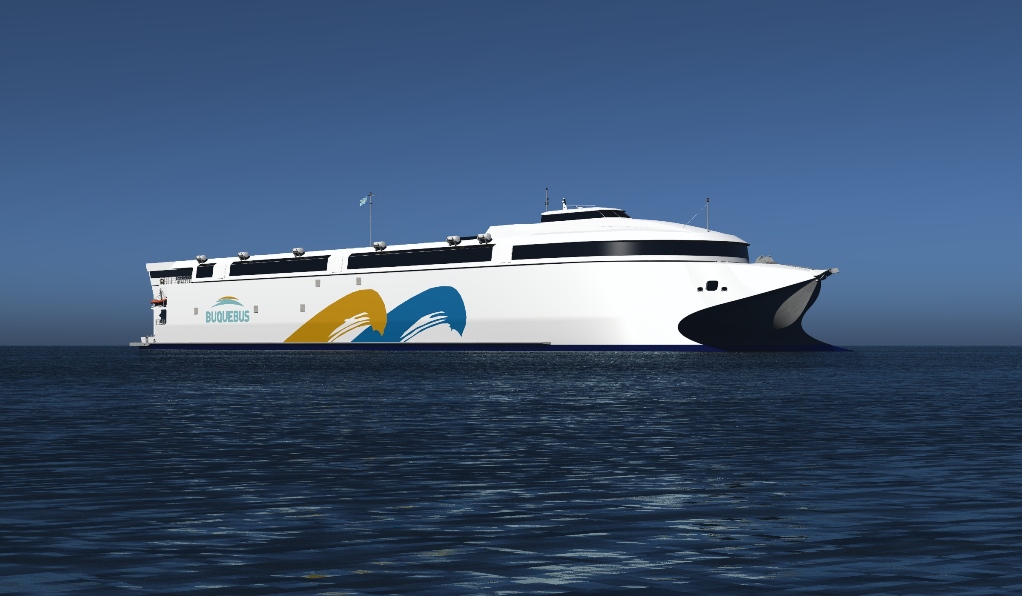Technology group Wärtsilä will power the biggest battery electric ship ever built with its battery electric propulsion system and waterjets. The vessel is a new ferry being built by Incat Tasmania and has been ordered by Incat’s long-term South American customer, Buquebús. With an overall length of 130 metres, the ferry will be the largest ever vessel of its type. It will also be the world’s first zero emissions, lightweight catamaran. The order with Wärtsilä was booked in July 2023.
The uniquely designed vessel will be fully battery powered, with e-motor driven Wärtsilä waterjets as the main propulsors. The battery modules and energy storage system package is four times larger than on any electric/hybrid ship currently operating.
“We are very happy to have taken this big leap forward towards decarbonised operations. Incat Tasmania has always been at the forefront of innovating and pioneering new technology and design, and this project further cements our market position. The design addresses the market’s needs and requirements by utilising batteries, making it a very viable option for owners and operators looking to increase the sustainability of their fleets. We would also like to thank Wärtsilä for supporting us with an extremely efficient, completely integrated propulsion package, and are really looking forward to working with them to make this project a huge success,” said Robert Clifford, founder and Chairman of Incat.
“The overall high-efficiency of this next-generation ferry represents a game-changing advance in catamaran design. We are proud to have contributed our strong know-how in integrating our ship electrification solutions and propulsion equipment. The battery power pack that we are supplying will be the largest ever supplied with a unique eight waterjet propulsor configuration. The eight e-motor waterjet propulsion configuration is the most efficient available on today’s market for this speed range and type application while boasting all the benefits from Wärtsilä’s axial flow waterjet technology – low weight, shallow draft, superb manoeuvrability, and low maintenance,” commented Roger Holm, President of Wärtsilä’s Marine Power business.
The full Wärtsilä scope of supply includes Wärtsilä’s own energy management system, the power conversion system, DC shore charging system, the 40 MWh battery modules, the DC hub, the eight electric motors, eight Wärtsilä axial flow WXJ1100 waterjets, and the ProTouch propulsion control system. Delivery of the Wärtsilä equipment is scheduled for the latter part of 2024, and the vessel will be delivered in 2025.
The vessel will operate between Argentina and Uruguay. It will carry 2,100 passengers and 225 vehicles.
Source: Wartslia.
Tags: Incat Tasmania, Wartslia, Zero Emissions



Recent Posts
Egypt Advances Maritime Decarbonisation with National Action Plan Backed by IMO
Fuelre4m unveils VIRDIS: A predictive AI breakthrough in global fuel distribution, powered by Five9nes
EXMAR Launches First Ammonia-Fueled Gas Carrier at HD Hyundai Mipo
Japan-Backed Green Hydrogen Centre Planned for Uttar Pradesh
JSW Group Outlines Major Push into Commercial and Heavy Electric Vehicles
Lloyd’s Register Grants Approval in Principle for KSOE’s Multi-Fuel Newcastlemax Bulk Carrier Design
Eureka Shipping Deploys HVO-Ready Cement Carrier Tamarack for Great Lakes Operations
Terntank Places Repeat Order for VentoFoil Wind Propulsion Units on Methanol-Ready Hybrid Tankers